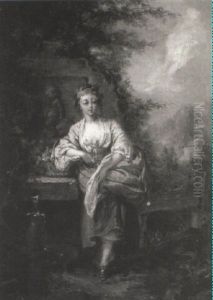Victor Louis Hugues Paintings
Victor Louis Hugues was not primarily known as an artist but rather as a key political figure during the French Revolutionary period. Born on July 20, 1762, in Marseille, France, Hugues's life was marked by his staunch support for the French Revolution and his efforts to spread its ideals in the Caribbean, particularly in the French colony of Guadeloupe. Despite the focus of the inquiry on an 'artist', it's essential to clarify that Hugues's contributions were in the political arena, and there's no significant record of him engaging in the traditional arts. However, his life and actions did dramatically influence the cultural and social landscape of the regions he impacted, which could be seen as a form of 'social artistry'.
After the outbreak of the French Revolution, Hugues aligned himself with the revolutionary government. He was appointed by the French Revolutionary authorities to take charge of Guadeloupe in 1794, with the mission of enforcing the abolition of slavery decreed by the French National Convention the previous year. His tenure in Guadeloupe was marked by fierce efforts to defend the island against British attempts to seize control, reflecting the broader conflict between France and Britain during the Revolutionary Wars. Hugues was successful in his defense of the island, and his administration implemented significant social changes, including the abolition of slavery, which he enforced rigorously, albeit temporarily until Napoleon's rise to power led to its reestablishment.
Hugues's role in Guadeloupe was not without controversy. His methods of maintaining control and defending the island included harsh measures and the establishment of a rigorous economic system that benefited the French state. Despite these controversies, his impact on the Caribbean's political and social history is undeniable, with his actions in Guadeloupe serving as a significant, though complex, chapter in the narrative of the French Revolutionary period's global influence.
After his time in the Caribbean, Hugues's political fortunes waxed and waned with the changing tides of French politics. He returned to France and continued to serve in various administrative capacities throughout the remainder of his life, though he never regained the prominence he held during his tenure in Guadeloupe. Victor Louis Hugues died on August 12, 1826, in Cayenne, French Guiana. While not remembered as an artist in the traditional sense, Hugues's life was emblematic of the turbulent and transformative period of the late 18th and early 19th centuries, making his biography a subject of interest for historians studying the French Revolution's global impact.









